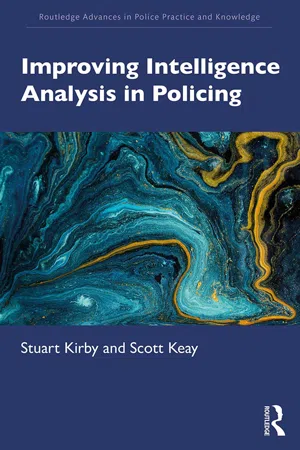
- 182 pages
- English
- ePUB (mobile friendly)
- Available on iOS & Android
eBook - ePub
Improving Intelligence Analysis in Policing
About this book
This book explains how improvements in intelligence analysis can bene!t policing. Written by experts with experience in police higher education and professional practice, this accessible text provides students with both practical knowledge and a critical understanding of the subject. The book is divided into three key parts:
- Part One outlines how the concept of intelligence was initially embraced and implemented by the police and provides a critique of intelligence sources. It examines the strategic use of intelligence and its procedural framework. It provides a summary of the role of the intelligence analyst, establishing the characteristics of effective practitioners.
- Part Two describes good practice and explains the practical tools and techniques that effective analysts use in the reduction and investigation of crime.
- Part Three examines more recent developments in intelligence analysis and looks to the future. This includes the move to multi-agency working, the advent of big data and the role of AI and machine learning.
Filled with case studies and practical examples, this book is essential reading for all undergraduates and postgraduates taking courses in Professional Policing, and Criminal Justice more widely. It will also be of interest to existing practitioners in this field.
Tools to learn more effectively

Saving Books

Keyword Search

Annotating Text

Listen to it instead
Information
Table of contents
- Cover
- Half Title
- Series Page
- Title Page
- Copyright Page
- Dedication
- Table of Contents
- List of illustrations
- Preface
- 1. Defining intelligence analysis and understanding its role in policing – past, present and future
- 2. Understanding the value and danger of intelligence sources
- 3. Improving the intelligence process: A managerial perspective
- 4. Improving intelligence analysis: An analyst perspective
- 5. Intelligence sources and techniques for crime reduction
- 6. Intelligence sources and techniques for the investigation of crime
- 7. The multi-agency partnership environment
- 8. The increasing influence of data in intelligence analysis
- 9. Improving intelligence analysis – meeting future challenges
- Index
Frequently asked questions
Yes, you can cancel anytime from the Subscription tab in your account settings on the Perlego website. Your subscription will stay active until the end of your current billing period. Learn how to cancel your subscription
No, books cannot be downloaded as external files, such as PDFs, for use outside of Perlego. However, you can download books within the Perlego app for offline reading on mobile or tablet. Learn how to download books offline
Perlego offers two plans: Essential and Complete
- Essential is ideal for learners and professionals who enjoy exploring a wide range of subjects. Access the Essential Library with 800,000+ trusted titles and best-sellers across business, personal growth, and the humanities. Includes unlimited reading time and Standard Read Aloud voice.
- Complete: Perfect for advanced learners and researchers needing full, unrestricted access. Unlock 1.4M+ books across hundreds of subjects, including academic and specialized titles. The Complete Plan also includes advanced features like Premium Read Aloud and Research Assistant.
We are an online textbook subscription service, where you can get access to an entire online library for less than the price of a single book per month. With over 1 million books across 990+ topics, we’ve got you covered! Learn about our mission
Look out for the read-aloud symbol on your next book to see if you can listen to it. The read-aloud tool reads text aloud for you, highlighting the text as it is being read. You can pause it, speed it up and slow it down. Learn more about Read Aloud
Yes! You can use the Perlego app on both iOS and Android devices to read anytime, anywhere — even offline. Perfect for commutes or when you’re on the go.
Please note we cannot support devices running on iOS 13 and Android 7 or earlier. Learn more about using the app
Please note we cannot support devices running on iOS 13 and Android 7 or earlier. Learn more about using the app
Yes, you can access Improving Intelligence Analysis in Policing by Stuart Kirby,Scott Keay in PDF and/or ePUB format, as well as other popular books in Politics & International Relations & Intelligence & Espionage. We have over one million books available in our catalogue for you to explore.